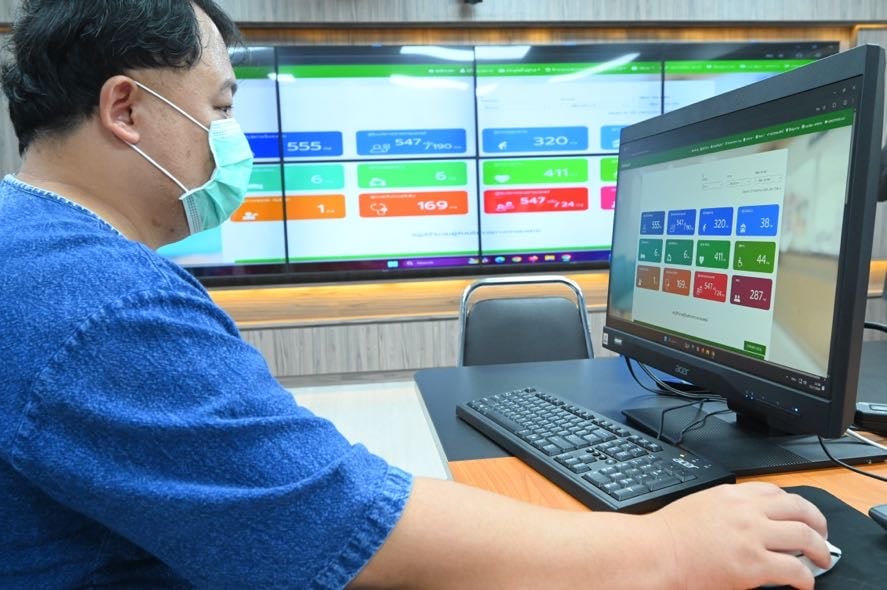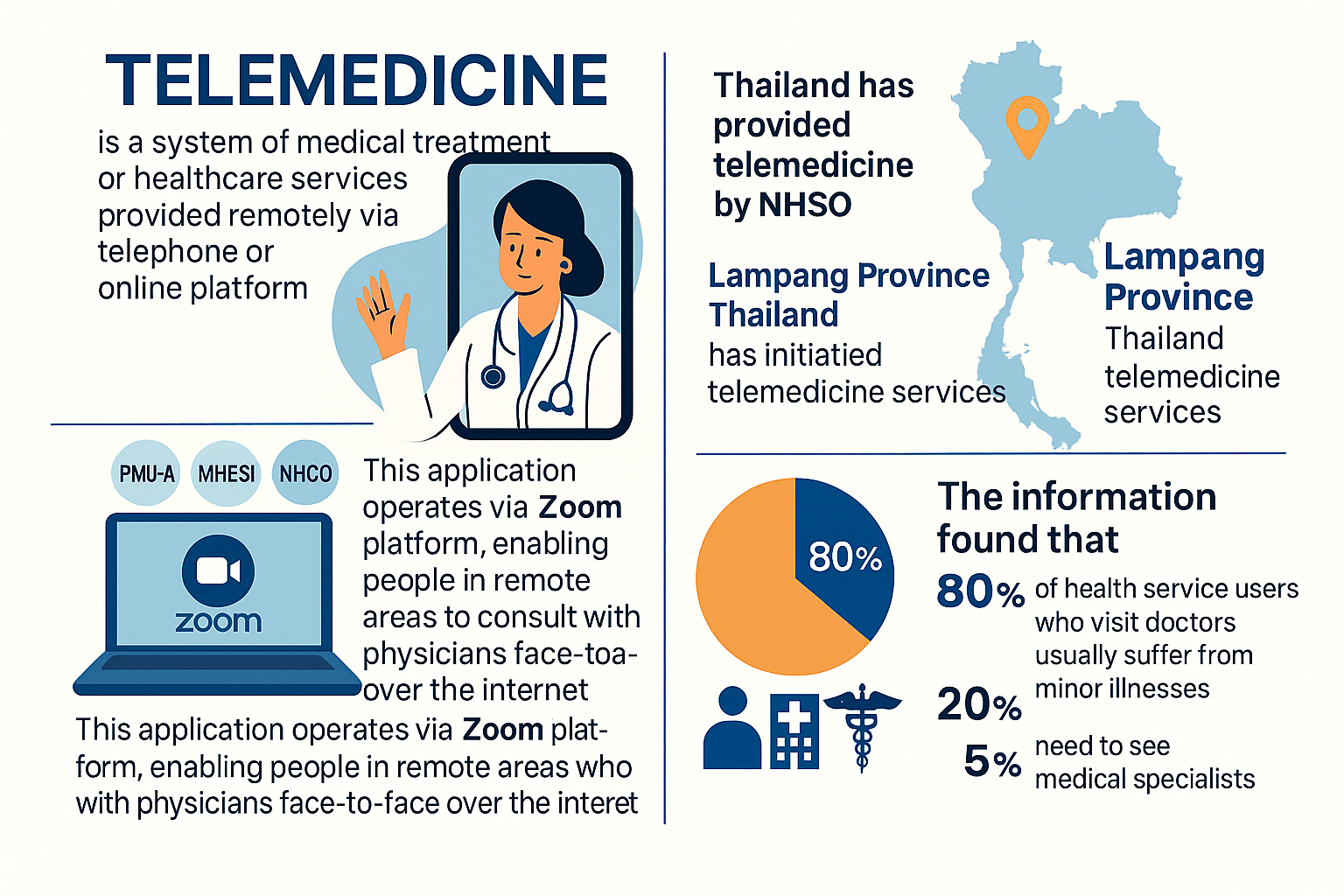
Lampang Provincial Administrative Organization: Pilot Initiative for Local Telemedicine Services
Source and Photo credit : https://www.thaipost.net/news-update/842773/ (Thaipost.net Website)
“Telemedicine” is a system of medical treatment or healthcare services provided remotely via telephone or online platform. Currently, the National Health Security Office (NHSO) and several private hospitals have begun offering telemedicine services to health service users. This has the advantage of saving travel time, and it also benefits health service users who are unable to visit hospitals conveniently, whether due to living in remote areas or having physical conditions that make traveling difficult. Through telemedicine, they can continue to visit doctors without interruption.
However, telemedicine services remain concentrated only in urban areas and have not yet expanded to other provinces. The exception is Lampang Province, where the Provincial Administrative Organization (PAO) of Lampang has initiated telemedicine services for the public.
Dr. Chaiyanan Thayawiwat, Deputy Chief Executive of the Lampang PAO, stated that the telemedicine services introduced by the Lampang PAO aim to strengthen the quality of the primary healthcare for the public. Physicians are scheduled to provide telemedicine consultations every afternoon. Most of the services involve health check-ups and medical advice; in cases where health service users exhibit symptoms of illness, initial treatment is provided. For more complex conditions, health service users are referred to hospitals, as healthcare staff are always present with the health service users during each telemedicine session.
A key tool employed in the Lampang PAO’s telemedicine system is an application developed with academic support from the Program Management Unit on Area Based Development (PMU-A), the Ministry of Higher Education, Science, Research and Innovation (MHESI). This application operates via the Zoom platform, enabling people in remote areas to consult with physicians face-to-face over the internet. Additionally, the initiative has received support from the National Health Commission Office (NHCO).

“We have found that 80% of health service users who visit doctors usually suffer from minor illnesses, 20% require hospital visits, and 5% need to see medical specialists. Telemedicine offers a practical solution for the majority, particularly those living in remote areas. We have piloted this service with over 100 people, all of whom expressed high satisfaction with the care provided. Lampang PAO has become a model for this initiative, which will be expanded to Lamphun PAO and Krabi PAO. In the following year, the focus will be on developing the operating system and establishing a health data collection system. This approach aims to promote preventive healthcare, reducing the need for treatment or complex medical interventions.”
Dr. Chaiyanan noted that in phase 2, the telemedicine system will be enhanced to allow the application to be accessible via mobile phones, with the capability to record consultations with physicians. Medical information from telemedicine sessions will also be documented, similar to hospital medical records, and managed by the Lampang PAO health team.
He expressed hope that this system would contribute to improving public health in Lampang, particularly for children, with the goal of enhancing their emotional quotient (EQ) to levels above 105. The system is also envisioned as a supportive tool for fostering children’s intellectual development and various skills in the future. In addition, it will address issues of obesity among children who are overweight as well as adults with excessive weight, which are major causes of non-communicable diseases (NCDs). The system will play a role in tackling these problems by using health data to provide guidance and counseling to the public. Overall, this initiative is expected to have a positive impact by preventing the onset of NCDs, which are currently a major national health concern.
“This system greatly benefits people in remote areas. For example, we provided telemedicine services to an ethnic 92-year-old who said that the last time he visited a doctor was when he was 20 years old, or they had not seen a doctor for 70 years until this telemedicine consultation.”
Dr. Preeda Taearak, Advisor to NHCO, Head of the Development of Telemedicine and Primary Healthcare System, Lampang province, mentioned that this project aims to enhance the quality of public health services for local administrative organizations, with a particular focus on reducing disparities and promoting social equity. The initiative is also part of broader urban development in five dimensions: human development, environment, economic growth, social harmony, and development partnerships.
For the research component, 7–10 subdistrict primary healthcare centers were selected as pilot sites, out of the total 67 Lampang primary healthcare centers transferred to the Lampang local administrative organizations. Encouragingly, the telemedicine system has already expanded its service coverage from 10 sites to 20 sites.
“We have also elevated service provision across multiple dimensions, including nursing, pharmaceutical counseling, health education, and a model primary healthcare system innovation center, extending these services to Lamphun and Krabi, with Lampang serving as the model.”
Assoc.Prof. Dr. Weerasak Krueathep, Director of Research and Innovation for Strengthening and Enhancing Capacity in Public and Local Administration at PMU, highlighted that PMU supports research to develop the telemedicine system of Lampang PAO, viewing it as a means to improve the quality of life for local residents. He noted that this system is particularly beneficial for people in remote areas, many of whom face financial constraints, as traveling to hospitals for medical consultations incurs significant costs. Currently, health staff from Lampang PAO bring telemedicine tools directly to the community, thereby providing these populations with greater access to medical services.
“Some of the families we encountered consist of elderly individuals with no income, relying solely on government-provided retirement pensions. Traveling to see a doctor requires hiring a motorcycle at a cost of 50 baht per trip, which is a significant expense for these people. Therefore, the telemedicine system can help this group gain access to health services.”
Dr. Chaiyanan emphasized that the telemedicine system developed in Lampang will continue to be further enhanced. It will be integrated with the National Health Security Office’system and connected to mobile phone platforms, enabling residents to access medical consultations via the internet conveniently and efficiently.
